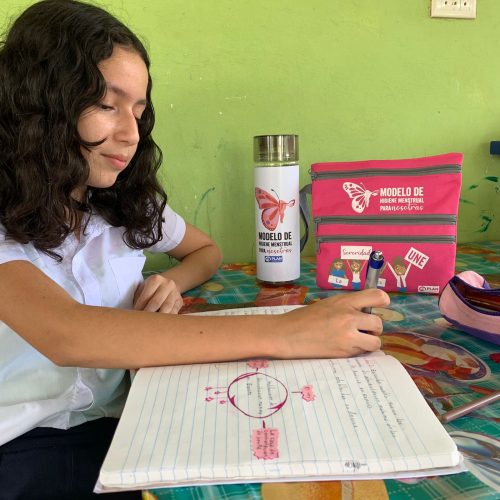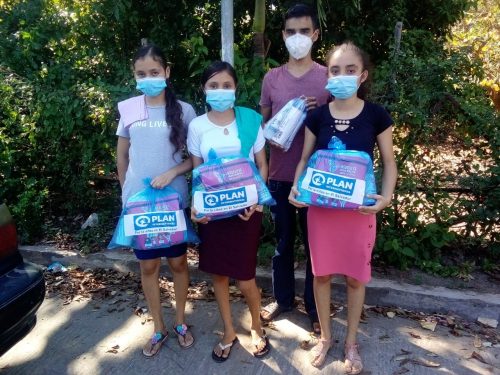Many young people in El Salvador lack the knowledge, supplies and safe spaces they need to comfortably manage their menstruation. This becomes particularly challenging during a flood where access to privacy and sanitation facilities can be limited. Plan International are working with communities to overcome these barriers and demystify menstruation.
As a member of the Zurich Flood Resilience Alliance, Plan International (Plan) work with four communities in El Salvador to strengthen their flood resilience. We’ve been using the Flood Resilience Measurement for Communities (FRMC) to better understand the challenges and opportunities in these communities, and identify what priorities will strengthen their flood resilience.
During this exercise we identified that during floods, girls, adolescents and young women as well as other young people who menstruate often have limited access to safe, private and adequate menstrual hygiene supplies and facilities.
Managing menstruation
Three components are needed for someone to properly manage their menstruation:
- Access to appropriate menstrual hygiene kits for storage, washing and drying;
- menstrual hygiene infrastructure, including water, sanitation, changing areas and waste disposal options; and
- menstrual hygiene education and awareness-raising activities.
We realised that many young people do not have access to these even in non-emergency times. Some girls and young women told us that they were unaware of any menstrual hygiene measures. If you cannot manage your menstrual hygiene in normal times, you’ll definitely struggle during a disaster.
The Power of Red Butterflies
“The Power of Red Butterflies” is the name of the programme we’re implementing to address the three components highlighted above. We have chosen the word “butterfly” as a symbol of strength and freedom (from myths, taboos, violence and harassment) and the word “red” symbolic of the menstrual cycle.
We aim to strengthen the agency of young people who menstruate by facilitating dialogue, sisterhood and resilience to live their menarche and menstruation without fear, shame, harassment or abuse.
Plan also support boys and young men in facilitating positive masculinities and ensure they understand and respect the natural menstrual cycle that young people who menstruate go through. This way we address issues of exclusion and discrimination that many of them face during menstruation.
To do this we developed a guide for the management of menstrual hygiene aimed at three principal target groups:
- Girls, adolescent girls, young women as well as other young people who menstruate;
- mothers and fathers;
- boys, adolescent boys and young men.
The guide includes information and education on menstrual hygiene, the promotion of a safe environment in an emergency context, and the delivery of appropriate supplies.
Plan implemented a series of workshops about the natural menstruation cycle in four communities reaching 160 girls, adolescent girls and young women as well as 80 boys, adolescent boys and young men.
Demystifying menstruation
Adriana is a 12-year-old sixth grader who lives in one of the flood-prone communities we work with. She has participated in the Power of Red Butterflies programme.
…when that moment came, I was not scared because I knew it was my menarche, which I learned about from the facilitators. I also felt the confidence to tell my mother about it when I saw the spot.
Adriana
Thanks to the training that Adriana received from Plan she was prepared for her first menstruation. Because she has done the training with her mother she feels more confident to speak to her about the changes she is experiencing. The training and Adriana’s first menstruation prompted her mother to share her own knowledge and experiences and teach Adriana how to look after herself.
Empowering young people who menstruate
I learned that my period will be different from that of other girls, it will depend on my own body. I learned about everything we can use for our menstruation. It is not only sanitary pads, I could also see tampons and how they should be used. We learned that if we don’t have these things, we can use a washcloth and wash it, that it is important to have water in our house and a safe place to change and feel comfortable in, also at school.
Adriana describing what the training with Plan taught her
Because of COVID-19 the training was delivered via social media. A range of activities were used including games, videos, pictures and audiobooks. Girls who didn’t have access to the right platform or strong enough internet connection joined Adriana at her house.
After the social media training, Plan gave the participants a kit which included sanitary towels, toilet paper, a torch, a compression for the pain, a menstrual calendar and flyers with information so that they can remember what they learned.

Sorority with other girls
Adriana describes how at school boys make fun of girls when they are menstruating. When they do Adriana and her class mates tell them that this is something normal and that they shouldn’t make fun of them because it happens to everyone, even their own mothers.
Some of her (male) class mates participated in the online workshops of Plan, and Adriana can talk to them when she has her period. She feels that they don’t make fun and they can help her. She tells them to talk to their friends, so that they don’t bully girls at school anymore.
Now, I feel I have to support other girls. If they need me, I can give them a pad, show them how to put it on, and explain to them that this is something normal and healthy. Us girls should stick together because menstruation happens to all of us. I shouldn’t make fun or discriminate. If a girl doesn’t have a towel. I can give her one of mine because in my community, many girls can’t afford to buy them.
Adriana
The importance of involving those who don’t menstruate
Alma is a 14-year-old eighth grader who, together with her two sisters and brother, participated in The Power of Red Butterflies training.

“It cleared up all doubts I had had about menstrual hygiene. I learned that menstruation is something normal that all women go through and that it is not something “dirty”.
Alma on how the Plan’s training changed her perception of menstruation
By promoting the participation of family members who don’t menstruate in the training taboos and misconceptions could be challenged. Alma describes the positive experience of learning and discovering how important the topic of menstruation is together with her family.
I tell my friends that menstrual hygiene is very important.
Alma
The link between flood resilience and education on menstruation
Not only in El Salvador, but globally many young people who menstruate stop going to school during their menarche because of lack of supplies, inadequate hygienic facilities or a general lack of awareness. This situation only increases further in times of emergencies.
That’s why Plan has made it a priority intervention to address this largely invisible need. Through “The Power of Red Butterflies” programme, Plan distributed menstrual hygiene kits for normal and emergency situations and, through a series of workshops, laid the ground work to make menstrual hygiene more visible in the participating families and the community as a whole.
Find out more about Plan’s work in El Salvador here.
We want to extend a big thank you to our Plan International colleagues Oswaldo Soto, Michel Galdamez, Sata Carraza and Brenda López for their contributions to this case study.

Comments